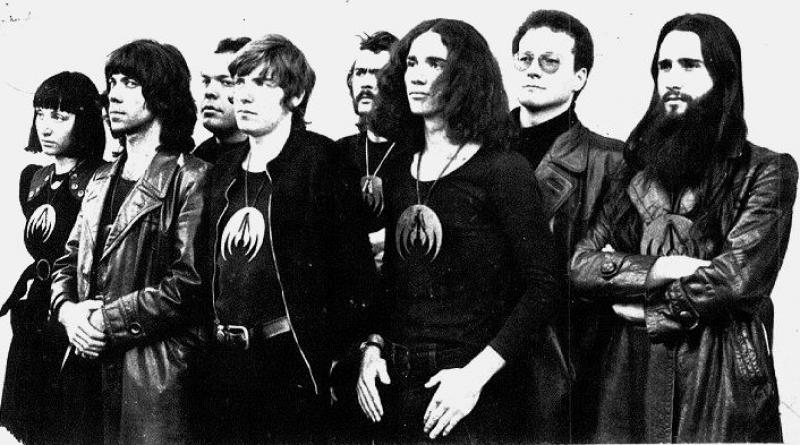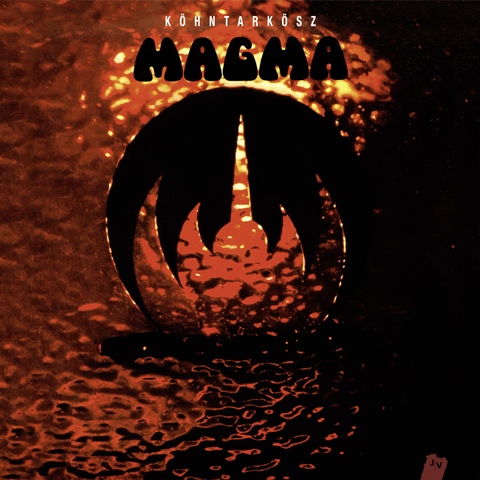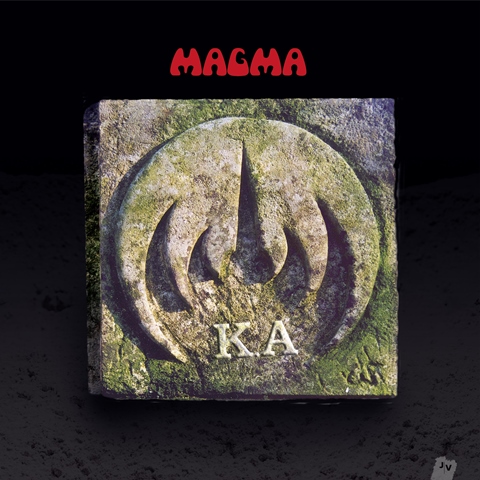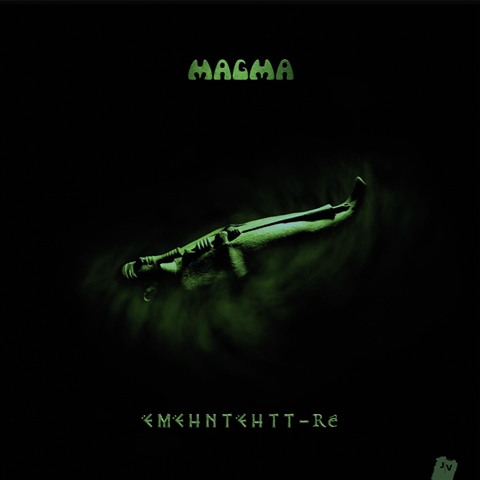Reissue CDs Weekly: Magma | reviews, news & interviews
Reissue CDs Weekly: Magma
Reissue CDs Weekly: Magma
The challenging French visionaries beloved of snooker ace Steve Davies and John Lydon

 Magma: Köhntarkösz, Köhntarkösz Anteria, Ëmëhntëhtt-Ré
Magma: Köhntarkösz, Köhntarkösz Anteria, Ëmëhntëhtt-Ré
“They were a Seventies phenomenon,” said snooker ace Steve Davies of Magma. “But they were a bit too far out there for most people, even if you liked progressive music. I didn't dare put them on the communal record player at sixth-form because they would have been booed off. Maybe it's because they were French.”
Magma – the band Davies declared his “true obsession” – are still going strong under the guidance of their visionary drummer Christian Vander. John Lydon was another fan. The vinyl-only reissue of three of their albums, 1974’s Köhntarkösz, 2004’s Köhntarkösz Anteria and 2009’s Ëmëhntëhtt-Ré, is accompanied by a new release, Rïah Sahïltaahk – an album reconfiguring material from their 1971 album 1001 Degrés Centigrades.
Köhntarkösz, Köhntarkösz Anteria and Ëmëhntëhtt-Ré were a thematically inter-related trilogy exploring the understanding of the nature of the universe, focussing on the quest for meaning undertaken by the pharaoh Ëmëhntëhtt-Ré. Ëmëhntëhtt-Ré the album revisits musical themes and tracks from three other previous Magma albums, restructuring them into a suite.
 A self-referencing and self-defining continuum, Magma are also, as Davies acknowledged, a challenging listen. Vander’s devotion to John Coltrane drives the band. They are not rock, jazz-rock or even fusion, but a unit fashioned to deliver a hard-edged music which never stands still. With the force of metal, nothing is dispensed straightforwardly. Compositions present themes, develop them and then layer on new themes while still pursuing their original path. Although formalist, this music is never linear. Improvisation is accommodated, but only within a rigid structure.
A self-referencing and self-defining continuum, Magma are also, as Davies acknowledged, a challenging listen. Vander’s devotion to John Coltrane drives the band. They are not rock, jazz-rock or even fusion, but a unit fashioned to deliver a hard-edged music which never stands still. With the force of metal, nothing is dispensed straightforwardly. Compositions present themes, develop them and then layer on new themes while still pursuing their original path. Although formalist, this music is never linear. Improvisation is accommodated, but only within a rigid structure.
The challenge is made even tougher by their lyrics being in Kobaïan, a Germanic-sounding language devised by Vander. He thought French would not suit this music. The mythology of the planet Kobaïa – settled by people who have fled a doomed Earth – dominates all Magma’s music. The conflicts, mythos, preoccupations and travails of the settler’s descendants – the Kobaïans – are documented in Magma’s apocalyptic music.
Of such stuff, a cult is made. And for the members of Magma, their black garb and the donning of the massive Kobaïan pendant brings the unified, quasi-military look of cult members. From all perspectives, Magma are a daunting proposition.
 When it comes to the music, Magma generally demand intense brow furrowing. They are not fun.The entry point here, and the essential one of these three reissues, is Köhntarkösz. The album begins with the 15-minute “Köhntarkösz part 1” which initially sounds like a percussion-heavy marriage of the breakdown section of an Emerson, Lake & Palmer workout and early King Crimson. Then, an operatic male voice begins intoning. Around three minutes in, it goes a bit twinkly but retains the percussive heaviness. Carl Orff and Soft Machine are in there as is, inevitably, Coltrane (the album’s final track is titled “Coltrane Sündïa”). If the British jazz-prog band Colosseum had developed a fondness for opera and a sore head, it would approach this. Unlike a lot of music from the progressive era, this was about creating impact rather than showcasing aimless musical chops. There is tonal shading, but Magma were intent on setting an unsettling ambiance.
When it comes to the music, Magma generally demand intense brow furrowing. They are not fun.The entry point here, and the essential one of these three reissues, is Köhntarkösz. The album begins with the 15-minute “Köhntarkösz part 1” which initially sounds like a percussion-heavy marriage of the breakdown section of an Emerson, Lake & Palmer workout and early King Crimson. Then, an operatic male voice begins intoning. Around three minutes in, it goes a bit twinkly but retains the percussive heaviness. Carl Orff and Soft Machine are in there as is, inevitably, Coltrane (the album’s final track is titled “Coltrane Sündïa”). If the British jazz-prog band Colosseum had developed a fondness for opera and a sore head, it would approach this. Unlike a lot of music from the progressive era, this was about creating impact rather than showcasing aimless musical chops. There is tonal shading, but Magma were intent on setting an unsettling ambiance.
Each of the three reissues sounds amazing. Köhntarkösz is more immediate and much punchier than an original French pressing: as if a layer of aural Vaseline has been removed. The trio are the opening salvo in a campaign reissuing the entire Magma back catalogue over this year. Although probably for the already converted and perhaps jazz-inclined fans of the similarly apocalyptic Killing Joke, Magma are a unique entity and worth properly hearing at least once. A good point to try them out will come in May, when their classic third album Mëkanïk Dëstruktïẁ Kömmandöh is reissued.
Steve Davies memorably summed it up. “While I think they are the best thing I've ever heard – challenging, stimulating, powerful – my wife thinks they've got a pact with the devil. People generally just go: sorry!”
Buy
Share this article
more New music
 The Songs of Joni Mitchell, The Roundhouse review - fans (old and new) toast to an icon of our age
A stellar line up of artists reimagine some of Mitchell’s most magnificent works
The Songs of Joni Mitchell, The Roundhouse review - fans (old and new) toast to an icon of our age
A stellar line up of artists reimagine some of Mitchell’s most magnificent works
 Album: Jonny Drop • Andrew Ashong - The Puzzle Dust
Bottled sunshine from a Brit soul-jazz team-up
Album: Jonny Drop • Andrew Ashong - The Puzzle Dust
Bottled sunshine from a Brit soul-jazz team-up
 theartsdesk on Vinyl: Record Store Day Special 2024
Annual edition checking out records exclusively available on this year's Record Store Day
theartsdesk on Vinyl: Record Store Day Special 2024
Annual edition checking out records exclusively available on this year's Record Store Day
 Album: Pearl Jam - Dark Matter
Enduring grunge icons return full of energy, arguably their most empowered yet
Album: Pearl Jam - Dark Matter
Enduring grunge icons return full of energy, arguably their most empowered yet
 Album: Paraorchestra with Brett Anderson and Charles Hazlewood - Death Songbook
An uneven voyage into darkness
Album: Paraorchestra with Brett Anderson and Charles Hazlewood - Death Songbook
An uneven voyage into darkness
 theartsdesk on Vinyl 83: Deep Purple, Annie Anxiety, Ghetts, WHAM!, Kaiser Chiefs, Butthole Surfers and more
The most wide-ranging regular record reviews in this galaxy
theartsdesk on Vinyl 83: Deep Purple, Annie Anxiety, Ghetts, WHAM!, Kaiser Chiefs, Butthole Surfers and more
The most wide-ranging regular record reviews in this galaxy
 Album: EMEL - MRA
Tunisian-American singer's latest is fired with feminism and global electro-pop maximalism
Album: EMEL - MRA
Tunisian-American singer's latest is fired with feminism and global electro-pop maximalism
 Music Reissues Weekly: Congo Funk! - Sound Madness from the Shores of the Mighty Congo River
Assiduous exploration of the interconnected musical ecosystems of Brazzaville and Kinshasa
Music Reissues Weekly: Congo Funk! - Sound Madness from the Shores of the Mighty Congo River
Assiduous exploration of the interconnected musical ecosystems of Brazzaville and Kinshasa
 Ellie Goulding, Royal Philharmonic Concert Orchestra, Royal Albert Hall review - a mellow evening of strings and song
Replacing dance beats with orchestral sounds gives the music a whole new feel
Ellie Goulding, Royal Philharmonic Concert Orchestra, Royal Albert Hall review - a mellow evening of strings and song
Replacing dance beats with orchestral sounds gives the music a whole new feel
 Album: A Certain Ratio - It All Comes Down to This
Veteran Mancunians undergo a further re-assessment and reinvention
Album: A Certain Ratio - It All Comes Down to This
Veteran Mancunians undergo a further re-assessment and reinvention
 Album: Maggie Rogers - Don't Forget Me
Rogers continues her knack for capturing natural moments, embracing a more live sound
Album: Maggie Rogers - Don't Forget Me
Rogers continues her knack for capturing natural moments, embracing a more live sound
 theartsdesk at Tallinn Music Week - art-pop, accordions and a perfect techno hideaway
A revived sense of civilisation thanks to dazzlingly diverse programming
theartsdesk at Tallinn Music Week - art-pop, accordions and a perfect techno hideaway
A revived sense of civilisation thanks to dazzlingly diverse programming

Add comment